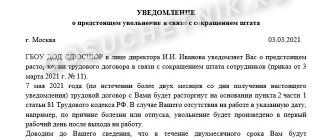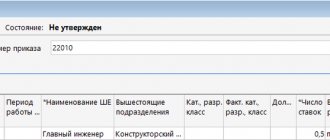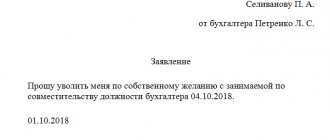Labor law in the Russian Federation, as in other countries, largely focuses on protecting the interests of the less protected party - the hired employee. It is almost impossible for an employer to fire a person without any reason other than his own intention. And then means are used to force the employee to agree to write a statement “of his own free will,” even if in fact he does not have such a desire.
In some situations, under such pressure, the application may be challenged and declared invalid. Let's look at the most common controversial situations related to forced dismissal and explain how you can protect yourself from this.
“Forced dismissal” in the language of law
The labor legislation of the Russian Federation provides a closed list of grounds on which an employer can dismiss an employee without his consent (Article 81 of the Labor Code of the Russian Federation). Mostly these are negative motives, reduction in numbers (staff) or liquidation of the organization itself. But often bosses, in flagrant violation of the Labor Code, force an unwanted employee to express his will to leave, supposedly “of his own free will”, “consent of the parties”, or falsify his statement.
Forcing dismissal is an employer’s actions aimed at influencing an employee to write a letter of resignation or draw up an agreement to terminate an employment contract.
Why, despite obvious unseemly behavior, do employers allow such actions? Because they are beneficial to them:
- you can quickly remove an unnecessary person from the staff;
- if you leave “at your own request” you will not have to pay severance pay or compensation;
- The team is shown a particular case of the use of superior power.
Results
Forcing a conscientious employee to resign at his own request is illegal. Even a submitted resignation letter can be withdrawn if another employee is not invited in writing to replace it. You should stock up on documents confirming your disagreement with dismissal “at your own request” and file a complaint with the State Tax Inspectorate.
We talked in more detail about the procedure for terminating an employment contract in our “Dismissal” section.
You can find more complete information on the topic in ConsultantPlus. Free trial access to the system for 2 days.
Popular methods of coercion
It is a rare tyrant boss who will invent something new in this area. Ways to “squeeze” a subordinate out of work are old and few in number, but, alas, quite effective:
- A request that cannot be refused. In most cases, the boss asks you to politely and convincingly write a letter of resignation. Or a threat may be used, even a physical one.
- “There is always something to be fired for.” If the answer to the request for self-care is negative, management may resort to blackmail: threaten that they will find a negative reason for dismissal at the initiative of the employer.
- "Extrusion." At work, at the instigation of superiors, an atmosphere of nagging and psychological discomfort is artificially created: public reprimands even for minor failures, disciplinary sanctions for the slightest violations of the routine, neglect of the right to promotion, deprivation of bonus payments, etc.
- “But the Code is not a decree for me.” The employer clearly neglects the rights of the employee: fines him, calls him to work overtime, delays, reduces or does not pay wages, etc.
IMPORTANT! If the inspection body catches the employer in one of these types of behavior, it is lawful to bring him to administrative responsibility for violating the requirements of the Labor Code of the Russian Federation.
Sometimes it's better to quit yourself
There are situations when forced dismissal is a benefit for the employee on the part of the employer. This may occur in cases where the alternative is dismissal under the article, especially with payments for the employee’s financial responsibility. Sometimes it is easier for an employer to quickly get rid of a guilty employee by allowing him to “save face” and not spoil the work book with unpleasant entries. Evidence of negative grounds for dismissal requires additional time and effort from the employer, as well as legally correct documentation.
In such cases, employees gratefully accept the offer to leave “of their own free will,” although this would also be forcing them to resign.
Methods of protection
In this case, the rule “the best defense is an attack” only partially works. If an employee decides to fight injustice, he should prepare an evidence base in advance and try not to give reasons for disciplinary action.
Sometimes it can be quite difficult to conduct your work life perfectly. Everyone has been late at least once, forgotten about some documents or matters. In this case, this may be an additional reason for an unscrupulous manager.
The best option in this case is to collect evidence, write a statement and further defend in court. As practice shows, judges often try to side with the employee.
Forced dismissal is an injustice that must be fought. You can't let yourself be intimidated. Of course, if management decides to remove someone, it will use all available methods, including psychological pressure. But the law is on the side of the victim, you just need not be afraid to defend yourself.
It's easier to force, it's hard to prove
Legal practice suggests that coercive employers often get away with impunity. There are several reasons for this:
- The offended party cannot prove duress. Often conversations about dismissal occur unexpectedly for an unwanted employee. As a rule, the employer makes sure that they take place without witnesses. Even if you press the record button on your phone in time, it will not be legal evidence for the court.
- Positive test result. If an organization receives an inspection from the prosecutor's office or labor inspectorate, this does not mean that it will be able to establish the fact of coercion, because it leaves no traces.
- The prosecutor's office will only “wag its finger.” Even if you complain to the prosecutor’s office and it takes the complaint seriously, all that it can do to the employer until the dismissal takes place is to issue a “warning” - simply a speculative measure that does not carry any legal consequences. A dismissal that has already taken place can only be challenged in court.
- “They didn’t know what they were doing.” Due to legal ignorance, many workers do not even realize that their rights are being violated.
ATTENTION! For more timid employees, the phrase “You are fired, write a statement!” is often enough. The image of an all-powerful boss is often shown in movies, so such a dismissal may seem legitimate to the average person.
What is the penalty for coercion?
If, nevertheless, the employer’s guilt is proven, the law provides for the following administrative liability for him (under Article 5.27 of the Code of Administrative Offenses of the Russian Federation):
- fine 1000 – 5000 rubles;
- disqualification for up to 3 years;
- reinstatement of the unfairly dismissed;
- payment of money for forced downtime;
- compensation ordered by the court.
If a pregnant woman was forced to leave and this can be proven, the liability becomes criminal (Article 45 of the Criminal Code of the Russian Federation): according to it, the guilty manager faces compulsory labor, and his company faces suspension of activities.
If an employee has written a letter of resignation
Grounds for dismissal
The general scheme for termination of employment relations is reflected in Art. 84.1 of the Labor Code of the Russian Federation. The HR manager should rely on it; it is also useful for the employee to know. The specific procedure for dismissal depends on the reason for termination of the employment contract; the Labor Code of the Russian Federation identifies the following:
- at the employee’s own request;
- at the initiative of the employer, including before the end of the employee’s probationary period;
- by agreement of the parties;
- due to the expiration of the employment contract;
- in connection with changes in the terms of the employment contract;
- on staff reduction;
- in connection with the employee’s violation of his labor duties;
- due to the death of an employee.
Dismissal at will - the most common basis for termination of an employment contract - is regulated by Art. Labor Code of the Russian Federation. The employee has the right to terminate the employment contract by notifying the employer in writing no later than two weeks in advance. The reporting period for this period begins on the next day after the employer receives the employee’s resignation letter. An employment contract can be terminated before the expiration of this period by agreement of the parties, and in addition, the Labor Code of the Russian Federation and judicial practice give employees legal grounds not to comply with the two-week period, but more on that later.
Important! If an employee who is on a probationary period has written a resignation letter of his own free will, he has the right to notify the employer in writing three days in advance (Article and Art. of the Labor Code of the Russian Federation).
So, the first stage of the process of dismissing an employee on his own initiative is an application in which he indicates the date of the last day of work, but not earlier than two weeks later. The application must be made in writing; moreover, the employee can send it by telegram. This method will also be within the law, provided that the postal specialists certify the employee’s signature with a separate entry (Order of the Ministry of Information and Communications of Russia No. 108 of September 11, 2007), in which case the telegram is received by Fr.
At any time before the expiration of the notice period for dismissal, the employee has the right to withdraw his application. In this case, the employment relationship does not terminate. An exception is if another specialist is invited in his place in writing, who, in accordance with Art. The Labor Code of the Russian Federation cannot refuse employment. And in some situations, the employee is recommended to withdraw the application. For example, if he fell ill during the current notice period. Having returned to work after sick leave, he may be unpleasantly surprised by the order to dismiss him, believing that it is impossible to fire him during vacation or temporary disability. This is only true for situations where dismissal occurs at the initiative of the employer (Article of the Labor Code of the Russian Federation), and not at the request of the employee.
Please note: if at the end of the notice period the employer does not take any action and the employee does not insist on dismissal, then the employment contract continues.
With Kontur-Personnel you will not miss the expiration date of the employment contract, which will help you part with your employee on time and painlessly
To learn more
How to issue a dismissal order
After considering the employee’s application, the employer issues a dismissal order. This is a mandatory stage for terminating an employment relationship for any reason. Most often, the unified form T-8 is used (approved by Resolution of the State Statistics Committee dated No. 1 of 01/05/2004), however, the employer has the right to develop his own order template. In any case, it must indicate the reason for termination of the employment relationship with reference to the relevant article of the Labor Code of the Russian Federation. For example, the entry may look like this: “On the initiative of the employee, clause 3, part 1, art. 77 Labor Code of the Russian Federation." The order should also indicate information about the employee’s application on the basis of which the document was drawn up.
The employee must be familiar with the employer's order against signature. An unsigned order may not be accepted by the court for consideration. If for some reason the employee refuses to familiarize himself with the dismissal order, the employer must draw up a statement of non-signing, certified by three employees.
What documents should I give to the person resigning?
On the last day, the employer must issue a work book to the resigning employee with a record of termination of the employment relationship. In it, as in the dismissal order, the wording must fully comply with the Labor Code of the Russian Federation or other federal law with reference to the relevant article, part, paragraph, etc.
The employer does not have the right to retain the work book for a single day. In case of delay, the employee has every right to go to court, and the organization will be obliged to compensate the employee for material damage, the basis is the damage caused as a result of illegal deprivation of his opportunity to work (Article 234 of the Labor Code of the Russian Federation). If an employee is absent from work on the day of dismissal or refuses to receive a work book, it is necessary to send him a notice of the need to obtain a work book or agree to have it sent by mail. A timely sent notice exempts the employer from delaying the issuance of the document.
Along with the work book, the employee should be given a medical book if it was kept by the employer.
By the time of dismissal, the accounting department must prepare and issue:
- a payslip that reflects accruals, deductions and the amount to be paid (Article 136 of the Labor Code of the Russian Federation);
- a certificate of the amount of wages, other payments and remunerations for the two calendar years preceding the year of termination of work, and the current calendar year, approved by order of the Ministry of Labor of Russia No. 182n dated April 30, 2013;
- certificate 2-NDFL;
- forms SZV-M and SZV-Stazh;
- calculation of insurance premiums.
At the request of the employee, he may be issued other documents related to his work at his previous place: certified copies of orders for admission to the organization, transfer to another job, dismissal, a salary certificate for the employment center, etc. The organization must prepare and provide to the employee within three days from the date of submission of the application (Article of the Labor Code of the Russian Federation).
If the deadlines are violated, the organization faces a fine of 30,000 to 50,000 rubles, and the manager - from 1,000 to 5,000 rubles. For a repeated violation, the amounts will increase: for an organization from 50,000 to 70,000 rubles, for a manager - from 10,000 to 20,000 rubles or disqualification for up to 3 years (Article 5.27 of the Code of Administrative Offenses of the Russian Federation).
Is it possible to fire someone on a day off?
Questions often arise about how to determine an employee’s last day of work if the dismissal date falls on a weekend. This can happen if the employee has not calculated the notice period for dismissal or if the employment contract expires on a holiday - this is discussed in Art. Labor Code of the Russian Federation: “If the last day of the period falls on a non-working day, then the day of expiration of the period is considered to be the next working day following it.” This will be the day when the employee receives all the documents and payments due to him.
A different situation is described in Art. 84.1 of the Labor Code of the Russian Federation “... the day of termination of the employment contract in all cases is the last day of work of the employee, with the exception of cases when the employee did not actually work, but, in accordance with this code or other federal law, his place of work (position) was retained.” This could be a vacation followed by dismissal. It is on the day before the vacation that the employer issues a dismissal order, transfers wages, due compensation, and issues documents. In this case, the date of dismissal in the order will indicate the last day of vacation, as the last working day, although in fact the employee no longer appears at his place.
If the employee does not want to “work” two weeks
The legislation provides for the possibility of dismissing a person without two weeks of “working off” if there are good reasons, such as:
- enrollment in an educational institution;
- retirement due to old age/long service;
- established violation by the employer of Russian labor legislation, etc.
Judicial practice takes the side of employees if one of the following situations is stated as the basis for urgent dismissal:
- Moving to another area (clause 7.2 of the Resolution of the USSR State Committee on Labor and Social Issues No. 240/22-3 1 dated 10/25/1983 “On approval of the clarification “On some issues related to the application of legislation on strengthening labor discipline”).
- Sending a husband (wife) to work abroad at a new duty station, moving a husband or wife to work in another area (confirmed by a certificate of transfer from the place of work).
- Moving to a new place of residence, which can be confirmed, for example, by a passport with a note on discharge (deregistration) and a departure sheet.
- Inability to live in this area or perform this work for medical reasons (confirmation - medical report).
- Caring for a child under 14 years of age, a disabled child, a sick family member or a group I disabled person (confirmed by a medical certificate).
- The desire to terminate the employment relationship of disabled workers, pensioners, pregnant women, as well as parents with three or more dependent children under 16 years of age, and students under the age of 18.
This is an open list and may be expanded. In order for an employee to have the right to resign on the day of filing an application or to reduce the period of notice on one of these grounds, it must be enshrined in the internal labor regulations or the organization’s Collective Agreement.
If an employee, without such “benefits”, wrote a statement asking to dismiss him earlier than two weeks later, the employer has the right to refuse him, citing Art. Labor Code of the Russian Federation. At the same time, the employer cannot indicate in the resolution on the application the date of dismissal that would comply with the requirements of the law. Sometimes, in order to resolve the issue, the employee is sent a notice indicating why his request cannot be satisfied (with reference to the normative act - Article 80 of the Labor Code of the Russian Federation), and is asked to write a new application.
There is nothing overly complicated in the standard procedure for dismissal at the initiative of an employee, but the employer must pay special attention to some points. In the following materials we will talk about more complex cases of termination of an employment contract: when an employee systematically violates his duties, in a situation of staff reduction, etc.
What to do if you are forced to leave
The first thing to decide in such cases is whether you really need the job. If they so clearly don’t want to see you there, is it worth spending precious time and effort on this workplace? If you are ready to give in, we can recommend protecting your interests as much as possible:
- resolve issues with the employer regarding the period and conditions of voluntary resignation;
- write a statement not of your own free will, but by agreement of the parties, stipulating the payment of severance pay and compensation.
If the decision is made to fight, then the advice will be as follows:
- voice your position to the employer: you know that they want you to “survive”, but you do not intend to give up;
- under no circumstances write or sign any documents about dismissal; make it a rule to carefully read all signed documents;
- scrupulously observe labor discipline and internal regulations;
- record all controversial issues in writing;
- do not give in to provocations;
- be prepared for unpleasant surprises (for example, not being allowed to work due to a medical examination not completed on time, an overly biased safety check, a truant taking time off that was formalized only in words, etc.).
What will serve as evidence of coercion?
You can sue an employer within a month from the date of dismissal. Not everything can serve as evidence in court. If you intend to sue your employer, you will have to take care of the evidence base:
- maximum documentation (for example, if you need time off, you should not rely on verbal permission, but submit a written request and receive it);
- video and audio recordings (their authenticity must be proven);
- witness statements.
FOR YOUR INFORMATION! The only almost indisputable evidence of forced resignation is the hiring of another employee on the day the plaintiff wrote the application: with a “real” dismissal in such a short period of time, it is unlikely that the right specialist will be found.
What should an employee do?
A person who is just being forced to quit or has already been fired has several options to choose from:
- Complain to the prosecutor's office.
- File a complaint with the labor inspectorate.
- File a claim in court.
Let's consider where and in what cases you should contact.
Complaint to the prosecutor's office
An application to the prosecutor's office can be submitted in person or online. According to clause 5.1 of the Order of the Prosecutor General's Office of Russia dated January 30, 2013 No. 45 “On approval and implementation...”, the appeal must be considered within 30 calendar days. If, as a result of the inspection, violations are revealed, the employer will be subject to an order to eliminate or a decision to hold accountable.
Note: the prosecutor may participate in court proceedings in cases of reinstatement after illegal dismissal, acting in the interests of the applicant.
Sample complaintComplaint to the labor inspectorate
You can also complain to the labor inspectorate. There, the application is also considered within 30 days. You can submit it in person or through the Online Inspection service. This is relevant if the employee is just being forced to resign or has already been fired.
Sample complaintGoing to court
An application to the court is filed if it is necessary to challenge the dismissal, change the wording, recover unpaid wages, or compensation for moral damage. You can contact them within a month from the moment you receive your work book or a copy of the order if you want to be reinstated in your position. For the collection of unpaid money, the statute of limitations is longer - one year from the moment when they should have been transferred (Article 392 of the Labor Code of the Russian Federation).
Important! City and district courts deal with such cases. Documents should be filed with the court at your place of residence or the address of the defendant.
Sample claim





